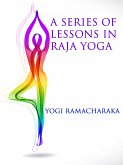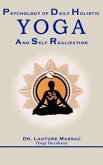Raja Yoga is also known as Ashtanga Yoga (Eight Steps of Yoga), because it is organised in eight parts:
- Yama - Self-control
- Niyama- Discipline
- Asana - Physical exercises
- Pranayama - Breath exercises
- Pratyahara - Withdrawal of the senses from external objects
- Dharana - Concentration
- Dhyana - Meditation
- Samadhi - Complete Realisation
The eight steps of Raja Yoga provide systematic instruction to attain inner peace, clarity, self-control and Realization.
Yama - Self-Control
consists of five principles:
- Ahimsa - Non-Violence
Ahimsa means not to cause pain or harm to any living being by thought, word or deed. Non-violence also means not to kill. Consumption of meat requires the death of an animal. It is due to this principle that Yogis are Vegetarian. Animals have a keen instinct, which heightens their awareness of impending death. They sense when they are to be slaughtered and are in mortal fear. Fear and stress hormones are released throughout their body. These hormones remain in the flesh of the slaughtered animal and are eaten by unsuspecting people. Many apparently groundless fears, neuroses and psychoses have their origin in this food. - Satya - Truthfulness
To always speak the truth is good and correct, but more important is how we convey the truth. We have the capacity to hurl truth at someone like a knife, but we are also capable of clothing that same truth in loving words. In order not to violate the principle of Ahimsa as mentioned above, we should heed the advice of Mahaprabhuji, who said: "Each of your words should fall like flowers from your lips".
To be truthful also means not to hide your feelings, not to be evasive or make excuses. Perhaps for some time we can hide our true face from the eyes of others, but there is at least one person knows our inner truth - our own self. Our own consciousness is a witness. - Asteya - Non-Stealing
Asteya means that you should never take anything that rightfully belongs to another. This means not only material objects, but also the stealing of mental property, to rob someone of an opportunity, hope or joy. The exploitation of nature and destruction of the environment also fall into this category. - Brahmacharya - Pure Way of Life
Brahmacharya is often translated as sexual abstinence. But it actually consists of much more. Brahmacharya means that our thoughts should always be turned towards God. This doesn't imply that we should neglect our duties in this world. On the contrary, we should fulfil these responsibilities with great care, but always with the awareness: "I am not the doer, God alone is the doer". - Aparigraha - Non-Accumulation of Possessions
We should not accumulate goods, but only acquire and use what we need to live. One who has many possessions, also has many worries. We are born without belongings and when we again depart from this world, we leave all behind. Nonaccumulation also means to grant other people their freedom - not to hold onto others. In letting go, we also free ourselves. Therefore, to give freedom means to also to be free one's self.
Dieser Download kann aus rechtlichen Gründen nur mit Rechnungsadresse in A, B, CY, CZ, D, DK, EW, E, FIN, F, GR, H, IRL, I, LT, L, LR, M, NL, PL, P, R, S, SLO, SK ausgeliefert werden.









